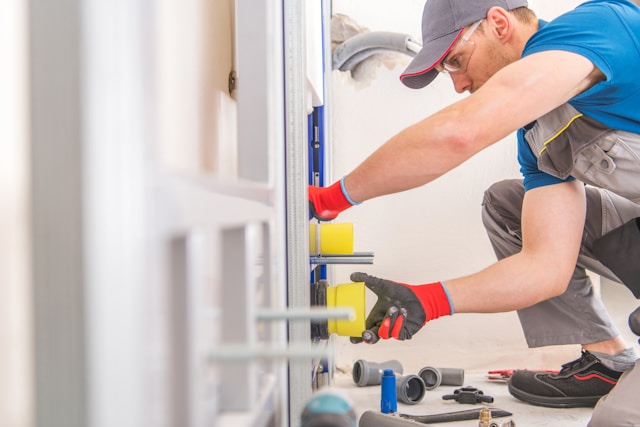Regular plumbing maintenance is essential to keeping your system running smoothly and avoiding unexpected and expensive repairs. By taking proactive measures, you can extend the life of your plumbing system and reduce the likelihood of emergencies. Here are some practical tips to maintain your plumbing and prevent costly problems.
1. Inspect for Leaks Regularly
Why It’s Important:
Small leaks can escalate into major issues if not addressed promptly, leading to water damage and high water bills.
What to Do:
- Check under sinks, around faucets, and near appliances like dishwashers for signs of water leaks.
- Look for damp spots, water stains, or mold on walls and ceilings.
- Fix dripping faucets and running toilets immediately.
2. Clean Drains to Prevent Clogs
Why It’s Important:
Clogged drains can lead to slow drainage, foul odors, and even burst pipes.
What to Do:
- Use drain covers to catch hair and debris in sinks and showers.
- Avoid pouring grease, oil, or coffee grounds down the kitchen sink.
- Flush drains monthly with hot water or a baking soda and vinegar solution.
3. Maintain Your Water Heater
Why It’s Important:
A well-maintained water heater operates efficiently and lasts longer, saving you energy and repair costs.
What to Do:
- Drain the tank annually to remove sediment buildup.
- Check the temperature setting; 120°F is ideal for efficiency and safety.
- Inspect the anode rod every few years and replace it if it’s heavily corroded.
4. Test Your Water Pressure
Why It’s Important:
High water pressure can strain your pipes and fixtures, leading to leaks and damage.
What to Do:
- Use a water pressure gauge to check your home’s water pressure; it should be between 40–60 psi.
- Install a pressure regulator if your water pressure is too high.
5. Insulate Pipes in Cold Weather
Why It’s Important:
Frozen pipes can burst, causing significant water damage and costly repairs.
What to Do:
- Wrap pipes in insulation foam, especially those in unheated areas like basements or attics.
- Let faucets drip during freezing temperatures to prevent pressure buildup.
- Seal cracks in walls and doors to keep cold air away from pipes.
6. Know the Location of Your Main Shut-Off Valve
Why It’s Important:
In a plumbing emergency, shutting off the water supply quickly can minimize damage.
What to Do:
- Locate the main water shut-off valve and ensure everyone in your household knows where it is.
- Test the valve periodically to ensure it works properly.
7. Schedule Regular Plumbing Inspections
Why It’s Important:
Professional inspections can catch small issues before they become big problems.
What to Do:
- Hire a licensed plumber to inspect your system annually.
- Focus on areas prone to wear and tear, such as water heaters, pipes, and fixtures.
8. Replace Old Pipes
Why It’s Important:
Aging pipes are more prone to leaks, corrosion, and bursts.
What to Do:
- Replace galvanized steel pipes with modern materials like PEX or copper.
- Watch for signs of aging pipes, such as discoloration, reduced water flow, or frequent leaks.
9. Protect Your Garbage Disposal
Why It’s Important:
Misuse of your garbage disposal can lead to clogs and damage.
What to Do:
- Avoid putting hard items like bones or fibrous materials like celery down the disposal.
- Run cold water while using the disposal to help flush debris through the system.
10. Watch for Signs of Sewer Line Problems
Why It’s Important:
Sewer line issues can cause backups, slow drains, and unpleasant odors.
What to Do:
- Monitor for gurgling sounds from drains or water pooling in unexpected places.
- Avoid planting trees near sewer lines to prevent root intrusion.
- Schedule regular sewer line inspections, especially if your home is older.
Conclusion
Taking care of your plumbing system with regular maintenance can save you money, time, and stress. By following these tips, you’ll reduce the likelihood of costly repairs and keep your plumbing in top shape.
If you’re unsure about a plumbing issue or need professional help, don’t hesitate to contact a licensed plumber. Investing in maintenance now will pay off in the long run with fewer problems and greater peace of mind.
